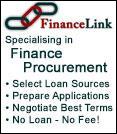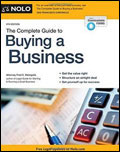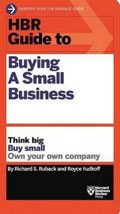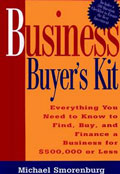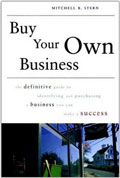
Financing Your Business Purchase
The biggest obstacle to sales being concluded is often the availability of funding and capital for the purchase.
While it is accepted that both franchisors and business sellers can often offer innovative and structured terms for the payment, there is always an element of the sale price that will need to be settled as an upfront cash payment. In addition, the new owner will also require available cash resources for working capital requirements until such time as the business is generating positive cash flows.
The traditional advice is that you should first be negotiating with the financial institutions with whom you have an established business relationship. They are familiar with your risk profile and can often offer financing instruments based on their knowledge of your asset structuring.
Other Financing Methods for Consideration
- SELLER FINANCING
It is estimated that the majority of sales at below the R5 million mark have a major component of seller provided finance. To facilitate the sale, the seller simply agrees to receive a portion of the purchase price in installments.
If the seller is dead against such an arrangement, then they should be giving you a good reason for that. No reason given means that there is a suspicion that they believe you will fail in the takeover and be unable to make the purchase price obligations. This should raise a red flag.
Some sellers, to demonstrate confidence and authenticate their claims to your chances of success, may even be prepared to link the payment obligations to your performance - such as by indexing the repayment amounts to your turnover results.
A seller is usually reluctant to go this route as they suspect there might be problems with repayment when the inevitable first instance of buyer's remorse sets in. It always will when the new owner meets the first headwinds and the seller would have been cautioned in that regard. So as buyer you need to take the initiative and offer an Acknowledgement of Debt for the full amount of the outstanding amount. That means the seller can sue on the document and get an instant judgement against you without the messy fighting over what was sold and assurances given, etc. You should be confident if your due diligence was thorough and be prepared to offer the AOD.
If you can offer the seller an AOD plus a surety from someone else then this could be a very feasible route to facilitate the sale.
- USE a FINANCE BROKER / CONSULTANT
Consider using the services of a specialised finance broker / consultant.
This is listed as your second consideration as a skilled advisor can match your acquisition to the many options available (several of which follow) and then help you prepare the best application for the best chance of a speedy solution.
For example : Midpoint Consulting Group
MCG specialises in arranging acquisition finance for buyers of SMEs and franchises. We prepare funder-ready applications, model the transaction, and engage DFIs, banks, and private credit partners to secure optimal funding structures.
- ASSET SECURED FINANCING
Use the business assets for asset secured financing. The business assets will effectively become yours once the sale is concluded. You will therefore be able to use those assets to fund their own purchase. This will rarely be a total solution but it could be useful bridging finance - and the assets may be of the type that lenders are happy to have as security.
- FIND a SURETY
Look to wealthy friends and relatives who are prepared to sign as sureties to guarantee repayment of any loan you can negotiate. For those people, you would only constitute a contingent liability and they would presumably have faith in your capacity to perform and not to endanger themselves in terms of having to meet your debt repayment obligations.
- PARTNER to CONTRIBUTE CAPITAL
Find a sleeping or active partner. You may not have considered the partnership route, but there are many positive benefits to be considered. Being on your own in running a business can be a lonely existance, if not limiting, and a good partner can sometimes accelerate growth dramatically. What you lose in equity may well be eclipsed by extra income.
Read our article on : How to Choose a Business Partner
- UNSUCCESSFUL BUYER as a PARTNER
- A potential partner may be someone who was an unsuccessful buyer who have expressed interest in buying this business ahead of you, but was unable to raise the required funds. That person will already be motivated in that the business has passed their approval process and their funds may be what you need.
- EMPLOYEES as PARTNERS
Also consider the possibility of certain employees showing interest in part ownership. They know the business, might always have wanted to own it, and would be super motivated to perform if they were building capital at the same time. This can be achieved in a number of ways, one being where you issue stock that has limited or no voting rights. You can then retain operational control.
In South Africa this could quality you for government sponsored grant funding fom the DTI and other agencies.
- STATE FUNDING - LOANS
If the business contributes to employment in an area where desperately needed, or if it provides critical services to deserving communities then you may qualify for a low cost government loan. Such loans are usually made at below standard commercial rates and the security requirement would also be reltively low with generous repayment terms and opportunities for extension. Action on default would also be far less severe than that of finance industry lenders.
- Department of Trade & Industry - the dti
- National Empowerment Fund - the NEF
- Small Enterprise Finance Agency - the SEFA
- STATE FUNDING - GRANTS
This is one of the most difficult to organise - but in effect these are free funds with no repayment. They are usually linked to BEE type deals and your labour force may end up owning most of the company, but you would have aquired it with free funds. Expect onerous paperwork and a long and rocky road but this can be done. There will generally be very specific requirements as to how the funds will be spent.
- Department of Trade & Industry - the dti
- Black Business Supplier Development Programme - BBSDP
- ANGEL INVESTORS
An angel investor (also known as a business angel, informal investor, angel funder, private investor, or seed investor) is an affluent individual who provides capital for a business start-up, usually in exchange for convertible debt or ownership equity. A small but increasing number of angel investors invest online through equity crowdfunding or organize themselves into angel groups or angel networks to share research and pool their investment capital, as well as to provide advice to their portfolio companies.Angel investors are often retired entrepreneurs or executives, who may be interested in angel investing for reasons that go beyond pure monetary return. These include wanting to keep abreast of current developments in a particular business arena, mentoring another generation of entrepreneurs, and making use of their experience and networks on a less than full-time basis. Thus, in addition to funds, angel investors can often provide valuable management advice and important contacts.
- 7 Important Differences Between Angels And VCs - Entrepreneur Magazine
- A Simple Guide to Angel Investors - SME South Africa
- Angel Hub Ventures
- Angel Fundraise - Angel Funding made easy
- Angel Investment Network
- Angel Investors - Entrepreneur Magazine
- Crowd Funding: Getting Money from the Masses - Entrepreneur Magazine
- South Africa Angel Investors
- Top Tips for Raising Angel Investment Funding - Entrepreneur Magazine
- PRIVATE EQUITY INVESTORS
Private equity firms are companies in which third party individuals invest their money into and the private equity firm in turn invests that money into other business, typically to either own a conrolling share of it.
The larger private equity firms prefer to invest in larger companies so you need to identify the smaller firms. They do not usually fund start-ups due to risk aversion.
- NEGOTIATE a LOWER PRICE
You could look on this as a type of funding in that paying less means your shortfall on price is less. The buyer might drop the price if you take over the responsibilty of collecting the debtors and the liability of paying the creditors. There may be other areas where you can assume the risk that the seller would normally carry. Perhaps the seller can continue to enjoy some of the business perks, such as motor vehicles and expense accounts.
Related Resources :
Buying a BusinessHow to Buy a Business
Restaurant Internet or Online Retail Manufacturing Service
Wholesale / Distribution Service Station / Convenience Store Liquors
Conducting a Due Diligence on Buying a Business
Selling a Business
Preparing Your Business for a Future Sale
How to Sell Your Business
Determining a Realistic Selling Price for Your Business
General Topics
Financing Sources for your Business Purchase
How to Choose a Business Partner

|
Anything we left out, stuff you don't agree with.? Good article, bad article.? Please give us your comments and suggestions. |

